-
 Bitcoin
Bitcoin $119100
-2.16% -
 Ethereum
Ethereum $4300
-0.31% -
 XRP
XRP $3.171
-2.99% -
 Tether USDt
Tether USDt $1.000
-0.01% -
 BNB
BNB $814.1
-1.33% -
 Solana
Solana $176.5
-4.67% -
 USDC
USDC $0.0000
0.00% -
 Dogecoin
Dogecoin $0.2267
-5.83% -
 TRON
TRON $0.3465
2.15% -
 Cardano
Cardano $0.7870
-4.98% -
 Chainlink
Chainlink $21.66
-2.27% -
 Hyperliquid
Hyperliquid $43.89
-4.62% -
 Stellar
Stellar $0.4414
-3.35% -
 Sui
Sui $3.707
-6.73% -
 Bitcoin Cash
Bitcoin Cash $599.1
3.73% -
 Hedera
Hedera $0.2504
-6.96% -
 Ethena USDe
Ethena USDe $1.001
-0.01% -
 Avalanche
Avalanche $23.21
-4.99% -
 Litecoin
Litecoin $121.1
-3.55% -
 Toncoin
Toncoin $3.415
0.45% -
 UNUS SED LEO
UNUS SED LEO $9.002
-1.24% -
 Shiba Inu
Shiba Inu $0.00001314
-5.43% -
 Uniswap
Uniswap $11.45
1.63% -
 Polkadot
Polkadot $3.926
-5.37% -
 Cronos
Cronos $0.1694
1.63% -
 Ethena
Ethena $0.8117
-2.35% -
 Dai
Dai $1.000
0.00% -
 Bitget Token
Bitget Token $4.422
-1.43% -
 Monero
Monero $264.2
-0.83% -
 Pepe
Pepe $0.00001137
-8.29%
What is the difference between 5x leverage and 5x contracts?
Leverage multiplies your trading position, with 5x leverage expanding it by five times, while contracts allow you to bet on future asset price changes without directly owning it.
Dec 16, 2024 at 11:09 am
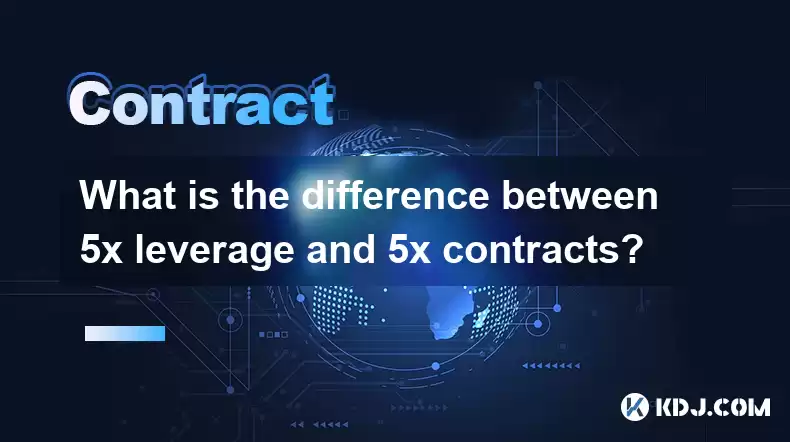
What is the Difference Between 5x Leverage and 5x Contracts?
Leverage and contracts are two powerful financial tools that allow investors to amplify their returns or mitigate risk. However, there are key differences between the two that are essential to understand before using them.
What is Leverage?
Leverage is a form of borrowing that allows investors to magnify the potential returns of an investment by using debt. When an investor uses leverage, they are essentially borrowing money from a broker to increase the size of their position. This can be used to either increase potential profits or reduce potential losses.
What are Contracts?
Contracts are financial instruments that allow investors to speculate on the future price of an asset. When an investor enters into a contract, they are agreeing to buy or sell an asset at a specified price on a future settlement date. Contracts can be used to either hedge against risk or speculate on the direction of an asset's price.
Key Differences Between Leverage and Contracts
There are several key differences between leverage and contracts:
- Asset Ownership: When you use leverage, you do not own the underlying asset. Instead, you are borrowing money from a broker to trade the asset. This means that you are not entitled to any dividends or other benefits that ownership would provide. With contracts, you do not own the underlying asset either. Instead, you are entering into a contract to buy or sell the asset at a future date. This means that you are not entitled to any dividends or other benefits that ownership would provide.
- Risk: Leverage can magnify both the potential returns and risks of an investment. If the price of the asset moves in your favor, you will make a larger profit. However, if the price of the asset moves against you, you will lose a larger amount of money. Contracts can also magnify the potential returns and risks of an investment. If the price of the asset moves in your favor, you will make a larger profit. However, if the price of the asset moves against you, you will lose a larger amount of money.
- Margin: When you use leverage, you are required to maintain a margin balance in your account. This margin balance is used to cover any potential losses that you may incur. If the price of the asset moves against you, you may be required to increase your margin balance or to close your position. With contracts, margin is not required.
- Settlement Date: When you use leverage, your trade is settled on the same day as it is executed. With contracts, your trade is settled on a future settlement date. This means that you have more time to hold a position with contracts than you do with leverage.
- Currency: Leverage is typically denominated in the currency of the asset that you are trading. Contracts can be denominated in a variety of currencies.
- Leverage is a multiplier that amplifies your trading position. A 5x leverage means that your position is five times larger than your initial investment. With a $1,000 investment and 5x leverage, your trading position would be $5,000.
- Contracts are a separate financial instrument that allows you to bet on the future price of an asset without buying it outright. A 5x contract means that you are betting that the price of the asset will increase or decrease by 5%.
- How Leverage Works: When you use leverage, you are essentially borrowing money from a broker to magnify the potential returns of an investment. This can be done by using a margin account, which allows you to borrow up to a certain multiple of your account balance. For example, if you have a $1,000 account balance and you use 5x leverage, you can trade with a position size of up to $5,000.
- How Contracts Work: Contracts are financial instruments that allow you to speculate on the future price of an asset without actually owning it. When you enter into a contract, you are agreeing to buy or sell an asset at a specified price on a future settlement date. If the price of the asset moves in your favor, you will make a profit. If the price of the asset moves against you, you will lose money.
- Choosing Between Leverage and Contracts: The decision of whether to use leverage or contracts depends on your individual trading goals and risk tolerance. Leverage can be a powerful tool for magnifying returns, but it can also magnify losses. Contracts can be a more flexible tool for speculating on the future price of an asset, but they can also be more complex to trade.
- Using Leverage Responsibly: Leverage is a powerful tool, but it should be used with caution. If you use too much leverage, you can quickly lose your entire investment. It is important to understand how leverage works and to manage your risk carefully.
- Using Contracts Responsibly: Contracts can be a complex financial instrument, so it is important to understand how they work before you start trading them. It is also important to manage your risk carefully when trading contracts.
- Risks of Leverage: The primary risk of leverage is that you can lose more money than you invested. This is because leverage amplifies both the potential returns and the potential losses of an investment. If the price of the asset moves against you, you may be required to increase your margin balance or to close your position.
- Risks of Contracts: The primary risk of contracts is that you can lose money if the price of the asset moves against you. This is because contracts are a leveraged product, which means that they can amplify both the potential returns and the potential losses of an investment.
- Benefits of Leverage: Leverage can be a powerful tool for magnifying returns. This can be beneficial if you are confident in your trading strategy and you are willing to take on additional risk.
- Benefits of Contracts: Contracts can be a versatile tool for speculating on the future price of an asset. They can be used to either hedge against risk or speculate on the direction of an asset's price.
Disclaimer:info@kdj.com
The information provided is not trading advice. kdj.com does not assume any responsibility for any investments made based on the information provided in this article. Cryptocurrencies are highly volatile and it is highly recommended that you invest with caution after thorough research!
If you believe that the content used on this website infringes your copyright, please contact us immediately (info@kdj.com) and we will delete it promptly.
- Dogecoin, Presale, Surge: Riding the Meme Coin Wave
- 2025-08-12 11:10:12
- Dogecoin, Tron, and the ROI Reality Check: What's a Crypto Investor to Do?
- 2025-08-12 11:15:12
- Ethereum Layer-2 Scaling Competition Heats Up as ETH Breaks $4K
- 2025-08-12 10:30:12
- China Regulation, Stablecoins, and BNB Presale: Navigating the Crypto Landscape
- 2025-08-12 11:30:12
- Meme Coins, Investment, and Token Burns: What's Hot in 2025?
- 2025-08-12 10:30:12
- BlockDAG, Chainlink, Hedera: The Cryptos Enterprises are Eyeing
- 2025-08-12 09:30:12
Related knowledge
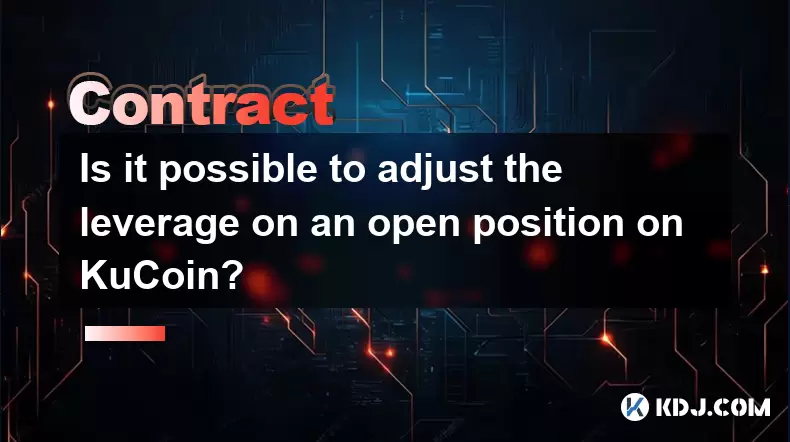
Is it possible to adjust the leverage on an open position on KuCoin?
Aug 09,2025 at 08:21pm
Understanding Leverage in KuCoin Futures TradingLeverage in KuCoin Futures allows traders to amplify their exposure to price movements by borrowing fu...

What cryptocurrencies are supported as collateral on KuCoin Futures?
Aug 11,2025 at 04:21am
Overview of KuCoin Futures and Collateral MechanismKuCoin Futures is a derivatives trading platform that allows users to trade perpetual and delivery ...
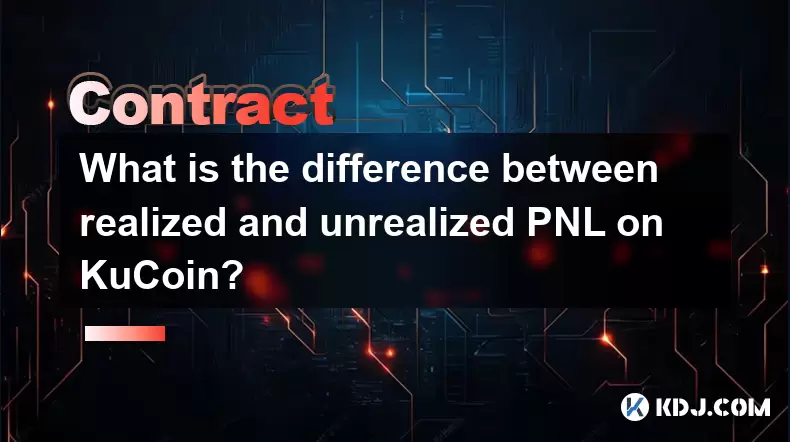
What is the difference between realized and unrealized PNL on KuCoin?
Aug 09,2025 at 01:49am
Understanding Realized and Unrealized PNL on KuCoinWhen trading on KuCoin, especially in futures and perpetual contracts, understanding the distinctio...

How does KuCoin Futures compare against Binance Futures in terms of features?
Aug 09,2025 at 03:22am
Trading Interface and User ExperienceThe trading interface is a critical component when comparing KuCoin Futures and Binance Futures, as it directly i...
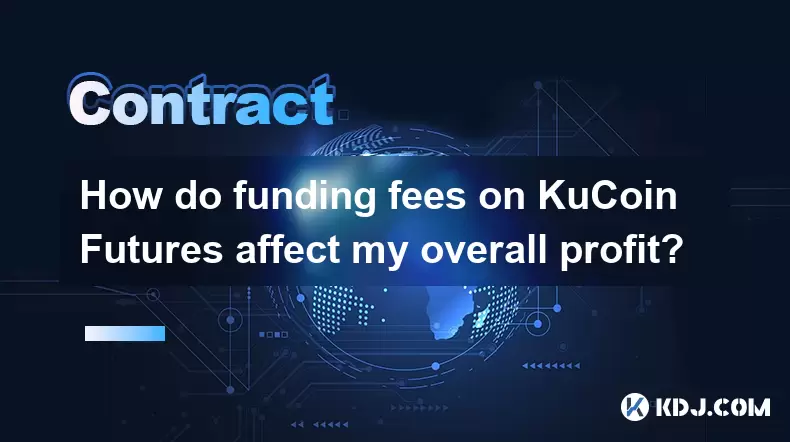
How do funding fees on KuCoin Futures affect my overall profit?
Aug 09,2025 at 08:22am
Understanding Funding Fees on KuCoin FuturesFunding fees on KuCoin Futures are periodic payments exchanged between long and short position holders to ...
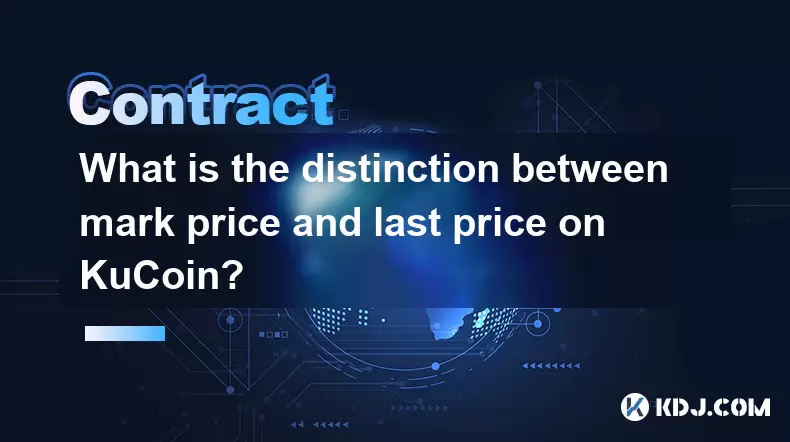
What is the distinction between mark price and last price on KuCoin?
Aug 08,2025 at 01:58pm
Understanding the Basics of Price in Cryptocurrency TradingIn cryptocurrency exchanges like KuCoin, two key price indicators frequently appear on trad...

Is it possible to adjust the leverage on an open position on KuCoin?
Aug 09,2025 at 08:21pm
Understanding Leverage in KuCoin Futures TradingLeverage in KuCoin Futures allows traders to amplify their exposure to price movements by borrowing fu...

What cryptocurrencies are supported as collateral on KuCoin Futures?
Aug 11,2025 at 04:21am
Overview of KuCoin Futures and Collateral MechanismKuCoin Futures is a derivatives trading platform that allows users to trade perpetual and delivery ...

What is the difference between realized and unrealized PNL on KuCoin?
Aug 09,2025 at 01:49am
Understanding Realized and Unrealized PNL on KuCoinWhen trading on KuCoin, especially in futures and perpetual contracts, understanding the distinctio...

How does KuCoin Futures compare against Binance Futures in terms of features?
Aug 09,2025 at 03:22am
Trading Interface and User ExperienceThe trading interface is a critical component when comparing KuCoin Futures and Binance Futures, as it directly i...

How do funding fees on KuCoin Futures affect my overall profit?
Aug 09,2025 at 08:22am
Understanding Funding Fees on KuCoin FuturesFunding fees on KuCoin Futures are periodic payments exchanged between long and short position holders to ...

What is the distinction between mark price and last price on KuCoin?
Aug 08,2025 at 01:58pm
Understanding the Basics of Price in Cryptocurrency TradingIn cryptocurrency exchanges like KuCoin, two key price indicators frequently appear on trad...
See all articles

























































































